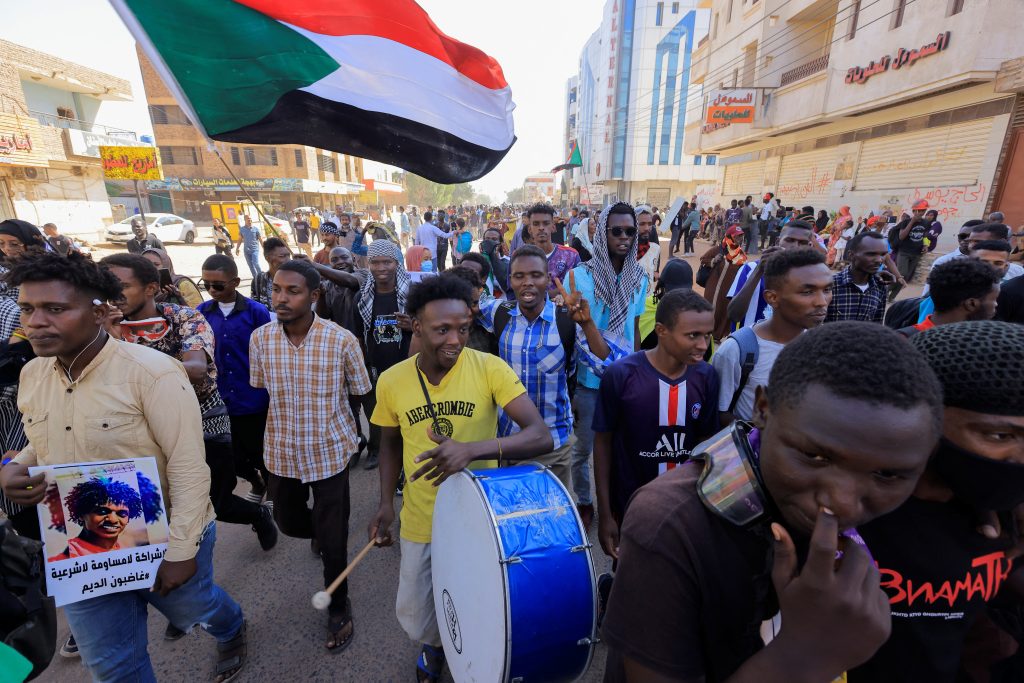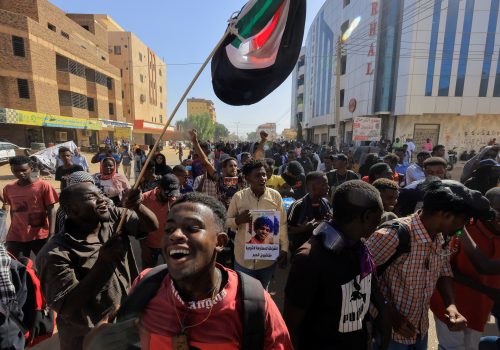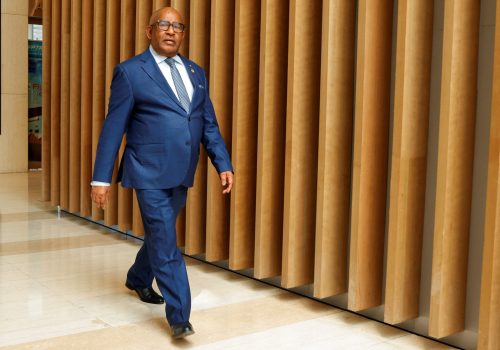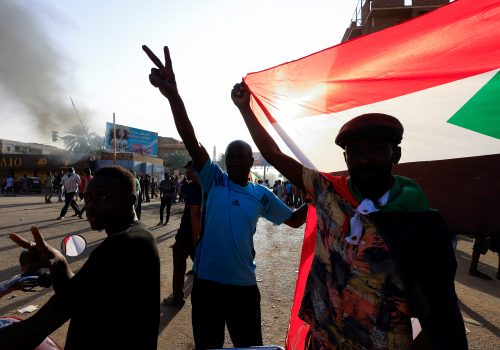Sudan’s political factions are negotiating the formation of a new transitional government, a major step toward a civilian-led government that is long overdue nearly eighteen months after a military coup led by General Abdel Fattah al-Burhan. Once the parties do form a new government—talks are continuing past a previously announced April 11 target date—perhaps its most critical task will be to clarify what role Sudan’s security forces will have in the country going forward.
To ensure that Sudan’s transition to democracy succeeds, its leaders must put limits on the power of the Sudanese Armed Forces (SAF) and the Rapid Support Forces (RSF). For a successful political transformation, the SAF, led by Burhan, and the paramilitary RSF, led by General Mohamed Hamdan Dagalo, must be governed by the rule of law and work to protect democracy and human rights in Sudan. Absent meaningful reform to rein in the existing power of the security services, institutional tension between the services could spark a wider conflict that would destabilize the country and threaten the transition to democracy.
Reform of the security services will not be easy, and it is the subject of ongoing debate as the factions try to strike a deal on a transitional government. But there are steps Sudan’s leaders and those who support Sudan’s transition to democracy can take now.
The struggle for reform
Sudan’s military has played a major role in the political landscape of the country since its independence in 1956. Omar al-Bashir came into power in a military coup and, following thirty years of autocratic rule, was removed in 2019 by another military coup. Following his ouster, civilian and pro-democracy leaders called for fundamental reforms of the security sector, but Sudan continues to struggle with attempts at reform.
During the transition to democracy since 2019, the SAF and RSF have both cooperated and competed with one another for power in the country. For example, in an October 2021 coup ousting Sudan’s civilian leadership led by then-Prime Minister Abdalla Hamdock, the SAF and RSF joined forces with an array of Sudan’s armed movements and marginalized groups. At the same time, the RSF and SAF compete with each other behind the scenes to retain as much economic and political power, influence, and control as possible.
Managing the tension between the SAF and RSF will be a paramount concern for Sudan’s leadership as it seeks to avoid future conflict between the security forces that could trigger greater violence. This is a key element to establishing peace, security, and sustainable development in the country while allowing for the development and modernization of Sudan’s security institutions.
Meaningful security sector reform must address the role of the SAF and the professionalization and integration of the RSF into the SAF. It must also place the security services firmly under civilian control and oversight. In the security sector, reforms to Sudan’s legal framework must include formally establishing the role of the security forces and a single national army trusted by local communities across Sudan, especially in the conflict areas of the country.
Another critical step is untangling the military institutions from the economy. This will be very difficult and will require careful planning, as the SAF and RSF currently dominate nearly all facets of political, economic, and media power in Sudan—and work to protect this influence. Civilian authorities should seize the moment and take steps to address the challenges of security sector reform in Sudan during the transition to civilian leadership. The Bashir regime created a vast array of expensive, corrupt, and ineffective security forces accused by critics of operating outside of the law, committing human-rights abuses, and creating an economy that directly benefits the security institutions—preventing more robust economic reform and development. To set the country on a better path, Sudan’s civilian leaders must enact reforms that begin to disentangle the military from the construction, telecommunication, aviation, and banking sectors.
Steps Sudan’s military and civilian leaders should take
In concert with the new civilian leadership, the military must commit to reform that helps modernize and develop the SAF. This includes ensuring that the SAF is tasked with protecting civilians and is accountable to the country’s civilian leadership. The SAF needs to be respected and not feared by those it is assigned to protect.
Civilian and military leaders must adopt legislation that addresses the specific gaps in Sudan’s transitional documents. Using the legal framework, civilian authorities should work with the military leadership to scale down the size of the SAF, find meaningful economic opportunities for former fighters, identify core priorities for its mission, and deploy a military that is able to meet the needs of the country. Sudan’s authorities should also identify funding to create and support a broad disarmament, demobilization, and reintegration strategy that avoids a sole focus on the reintegration of militia fighters and includes appropriate financial oversight.
Outside of these efforts, civilian authorities must look for ways to reform Sudan’s economy that help to disentangle the vast array of companies linked to the security services, create opportunity to improve the business environment, and send the signal to investors, banks, and credit rating agencies that Sudan is open for business. Civilian authorities must take steps to increase transparency and accountability in the illicit gold trade to disrupt illicit financial flows to Sudan’s militias, including the RSF.
As Sudan’s economy faces uncertainty due to elevated food, fuel, and transportation prices, the International Monetary Fund (IMF) and World Bank must balance the need for economic reforms in the country with the imperative to not destabilize a new civilian-led government. This government will need to walk a difficult line to implement reforms that address economic mismanagement by the SAF, the rising cost of living, and stubbornly high prices for basic goods that have further complicated efforts to secure international funding and support for the economy.
Steps the United States should take
The United States can help Sudan’s transition to democracy and help facilitate security sector reform. The 2021 National Defense Authorization Act included the Sudan Democratic Transition, Accountability, and Fiscal Transparency Act of 2020, elevating Sudan on the foreign policy agenda and sending a signal to Sudan’s new leadership that the United States is ready to support Sudan as it enacts difficult reforms. This law is an effective messaging tool, encourages a coordinated US government response to support the civilian leadership, and can direct public reporting on sensitive issues, support a sanctions regime, and show the private sector that Sudan is not open for business as usual. Policymakers can use this legislation to support Sudan’s economic reforms, stability, and oversight of the security and intelligence services in the short term while seeking to hold human-rights abusers, spoilers to the transition, and those seeking to exploit Sudan’s natural resources accountable for their actions.
Working with other countries, the United States can also play a leading role to encourage international financial institutions to carefully leverage the approval of World Bank projects, consider withholding IMF disbursements, and institute public reporting to ensure that economic and security sector reforms remain on track. The diplomatic community must continue to apply coordinated pressure on Sudan’s authorities to ensure that they follow through on their verbal commitments and work with key external actors—including the United Arab Emirates and Egypt—to encourage them to be meaningful contributors to Sudan’s democratic progress.
Sudan’s transition to democratic leadership provides another critical opportunity for security sector reform in the country. As the transitional government moves forward, Sudan’s civilian leadership can show investors, banks, and its people that greater connectedness to the global economy, a modern security apparatus, and a commitment to fighting corruption is in its long-term interest. Doing so would solidify a path toward a peaceful and democratic Sudan.
Benjamin Mossberg is the deputy director of the Atlantic Council’s Africa Center. Previously, he led US Treasury Department efforts to combat corruption, money laundering, terrorist financing, and financial crimes on the African continent.
Further reading
Mon, Jan 30, 2023
How the international community can help restore Sudan’s democracy
AfricaSource By
A number of challenges confront Sudan on its road to democracy. How the country's leaders and the international community address them could either make or break the dreams of the 2019 revolution.
Thu, Feb 23, 2023
The African Union is at a crossroads. It’s time to seize its moment.
AfricaSource By Rama Yade
The African Union needs to be strong inside to be strong outside. The new chair will need to kick off an exploration of the Union's organization, identity, role, and means.
Mon, Apr 11, 2022
The days of elite deals in Sudan should be over
AfricaSource By
It is not too late for Washington to correct the course on Sudan and help stave off another democracy-delaying elite pact.
Image: Protesters march during a rally against a signed framework deal between political parties and the military that provides for a two-year civilian-led transition towards elections and would end a standoff triggered by a coup in October 2021, in Khartoum, Sudan December 8, 2022. REUTERS/Mohamed Nureldin Abdallah



